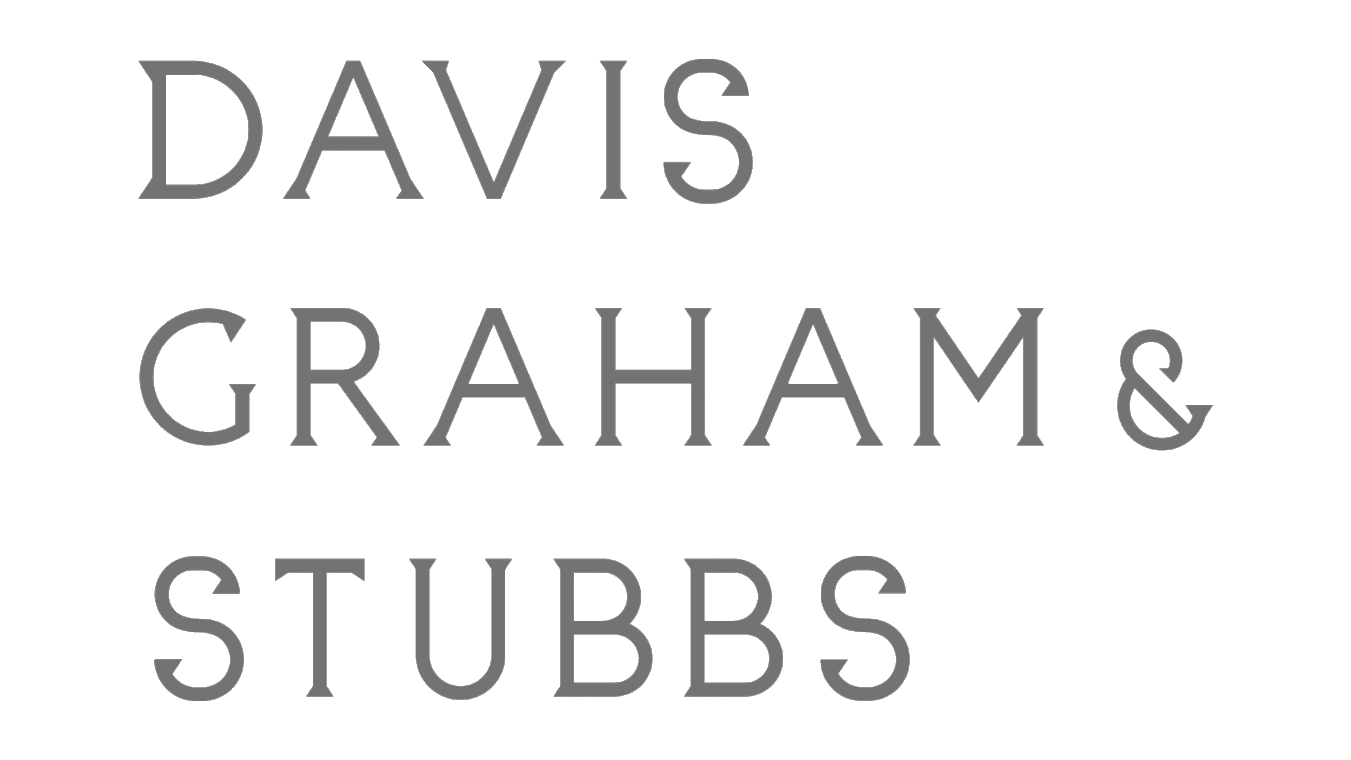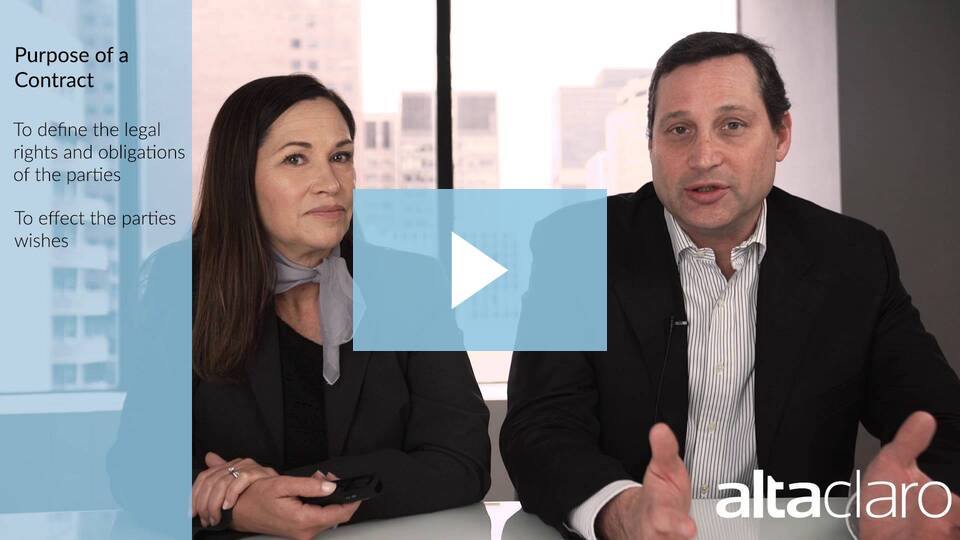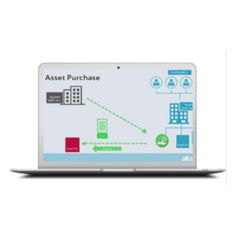World Class Experiential Legal Training For Law Firms
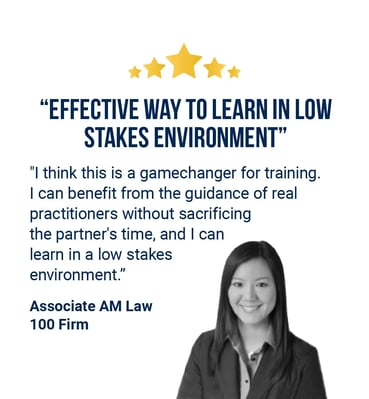
WORLD CLASS EXPERIENTIAL LEGAL TRAINING FOR LAW FIRMS
.png)
WORLD CLASS EXPERIENTIAL LEGAL TRAINING FOR BOUTIQUE TO MID-SIZE FIRMS
Elevate Your Law Firm and Your Attorneys
Increase Associate Performance and Productivity
With AltaClaro you can
-
Get your associates billing sooner.
-
Increase training retention and engagement.
-
Save on resources used for legal skills training
-
Choose to leverage our materials and instructors, or supplement with your firm's resources.
The AltaClaro Difference
Effective Learning with ROI
Backed by Education Science
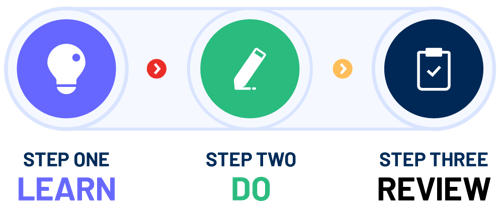
Step 1: Learn
Learn at your own pace, absorbing lessons in short, easily digested segments led by experienced practitioners.


Step 2: Do
Apply what you've learned to solve real-world client scenarios, using transaction documents derived from actual deals.
Step 3: Review
Deepen your learning in virtual review sessions with an experienced practitioner. Review model answers and ask questions.

Empower Associates to Own Their Growth
Empower your associates with detailed, personalized feedback on simulated assignments in key practice areas, focusing on core competencies, practical skills, and substantive legal know-how.
This targeted approach fosters:
Clear Insight
Associates gain a strong understanding of their strengths and areas for growth.
Focused Development
Associates can prioritize the core competencies, skills and issues most critical for their success.
Greater Self-Awareness
Associates are empowered to take ownership of their professional development journey.
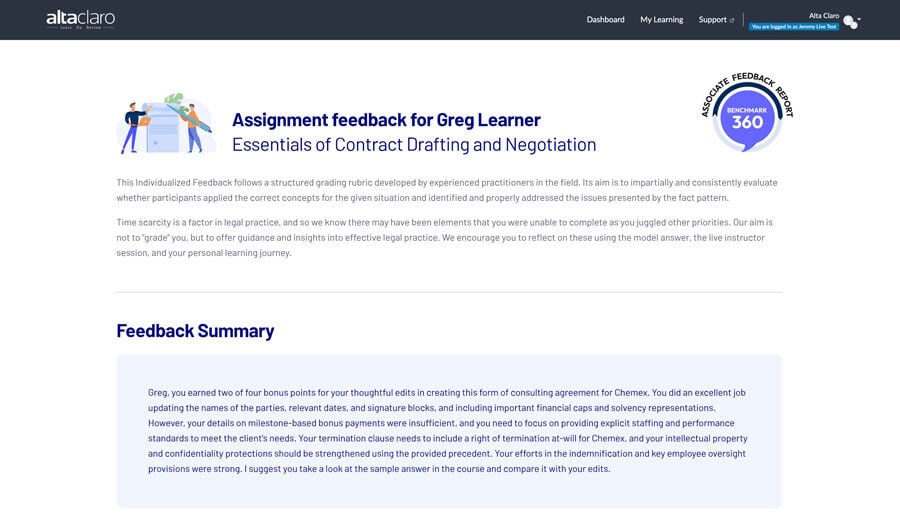
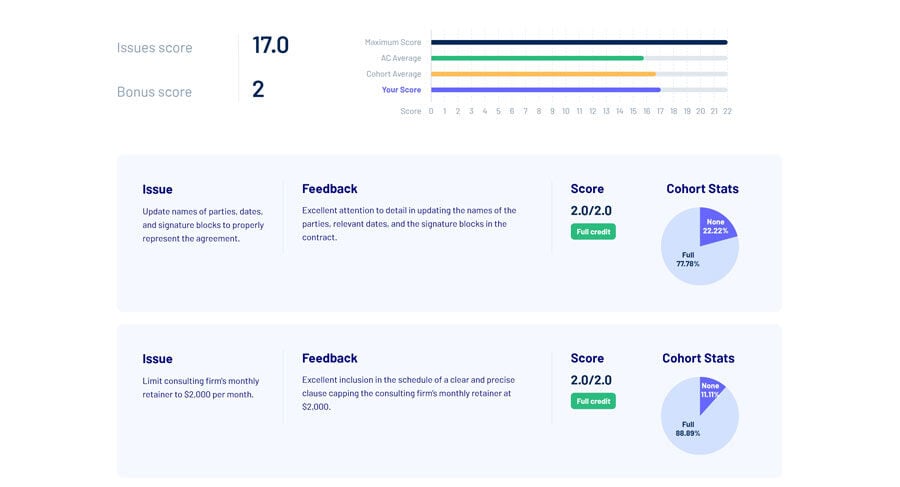
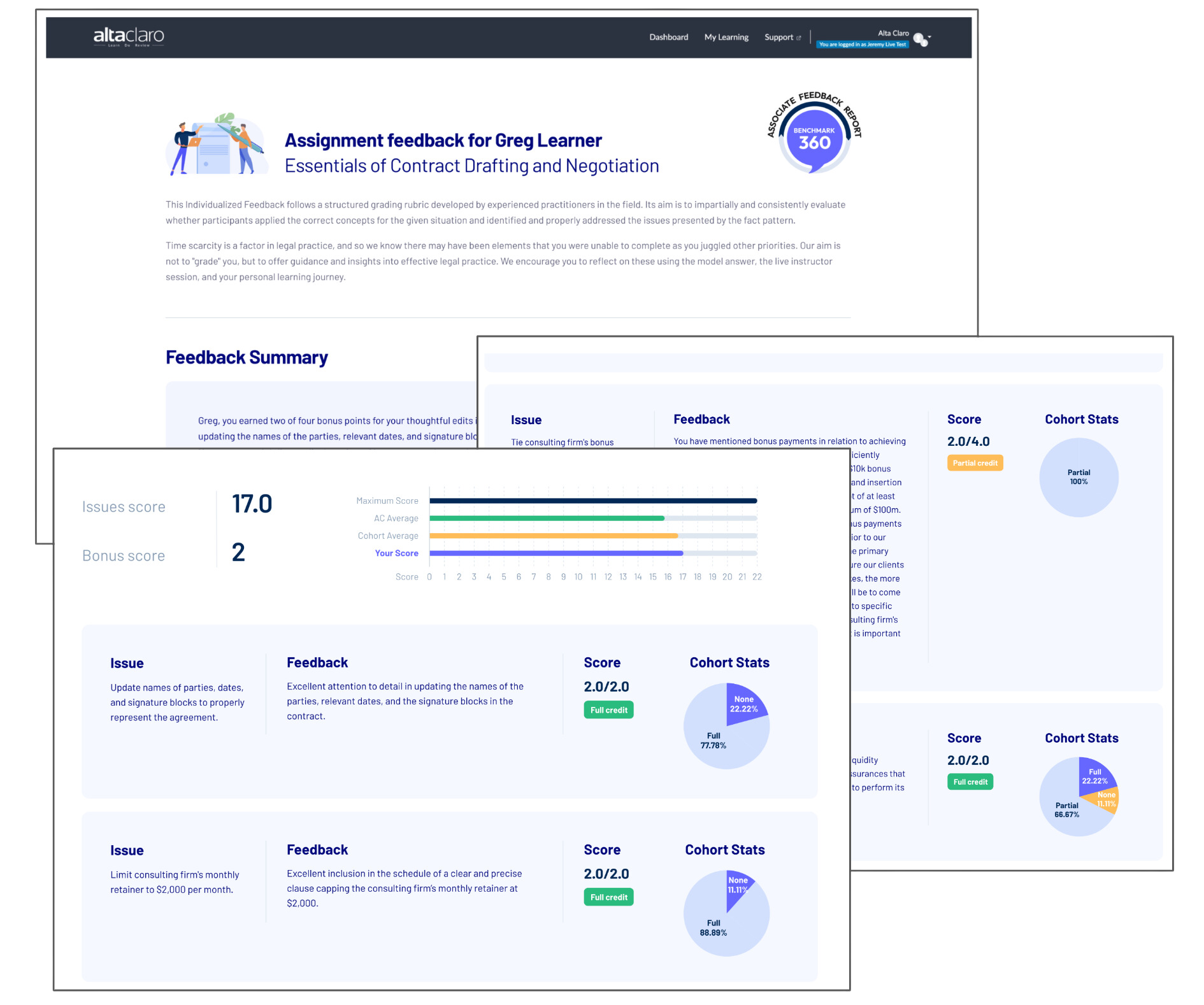
Empower your associates with detailed, personalized feedback on simulated assignments in key practice areas, focusing on core competencies, practical skills, and substantive legal know-how.
This targeted approach fosters:
- - Clear Insight: Associates gain a strong understanding of their strengths and areas for growth.
- - Focused Development: Associates can prioritize the core competencies, skills and issues most critical for their success.
- - Greater Self-Awareness: Associates are empowered to take ownership of their professional development journey.
Explore 40+ Master Classes:
Increase Associate Performance and Productivity
With AltaClaro you can
- - Get your associates billing sooner.
- - Increase training retention and engagement.
- - Save on resources used for legal skills training.
- - Choose to leverage our materials and instructors, or supplement with your firm's resources.
Explore 40+ Master Classes:
Why Even Have a Contract as Opposed to an Oral Agreement?
Purpose of a Contract
Corporate Transactions
5+ courses
Corporate Transactions
- Essentials of Contract Drafting
- Forming Corporations and Other Entities
- Drafting and Negotiating NDAs
- Drafting and Negotiating Letters of Intent
- Transactional Due Diligence and Disclosure Schedules
M&A Transactions
5+ courses
M&A Transactions
- Overview of M&A Transactions
- M&A Deal Process
- Drafting & Negotiating Asset Purchase Agreements
- Drafting & Negotiating Stock Purchase Agreements
- Drafting & Negotiating Merger Agreements
Capital Markets
5+ courses
Capital Markets
- Overview of Capital Markets
- Regulation D Offerings
- Public Offerings (IPOs)
- Due Diligence in Securities Offerings
Corporate Transactions
5+ courses
Corporate Transactions
- Essentials of Contract Drafting
- Forming Corporations and Other Entities
- Drafting and Negotiating NDAs
- Drafting and Negotiating Letters of Intent
- Transactional Due Diligence and Disclosure Schedules
M&A Transactions
5+ courses
M&A Transactions
- Overview of M&A Transactions
- M&A Deal Process
- Drafting & Negotiating Asset Purchase Agreements
- Drafting & Negotiating Stock Purchase Agreements
- Drafting & Negotiating Merger Agreements
Capital Markets
5+ courses
Capital Markets
- Overview of Capital Markets
- Regulation D Offerings
- Public Offerings (IPOs)
- Due Diligence in Securities Offerings
Corporate Transactions
5+ courses
Corporate Transactions
- Essentials of Contract Drafting
- Forming Corporations and Other Entities
- Drafting and Negotiating NDAs
- Drafting and Negotiating Letters of Intent
- Transactional Due Diligence and Disclosure Schedules
M&A Transactions
5+ courses
M&A Transactions
- Overview of M&A Transactions
- M&A Deal Process
- Drafting & Negotiating Asset Purchase Agreements
- Drafting & Negotiating Stock Purchase Agreements
- Drafting & Negotiating Merger Agreements
Capital Markets
5+ courses
Capital Markets
- Overview of Capital Markets
- Regulation D Offerings
- Public Offerings (IPOs)
- Due Diligence in Securities Offerings
Commercial Lending Transactions
5+ courses
Commercial Lending Transactions
- Overview of Commercial Loan Transactions
- Managing Closings in Loan Transactions
- Drafting and Negotiating Credit Agreements for Lending Transactions
- Drafting and Negotiating Security and Other Collateral Agreements
- Documenting and Perfecting Security Interests in Collateral
Technology Transactions
5+ courses
Technology Transactions
- Overview of Technology Transactions
- Foundations of Drafting SaaS Agreements
- Drafting and Negotiating Software Development Agreements
- Privacy and Data Security Considerations in Technology Transactions
- Drafting and Negotiating IP Licensing Agreements
Commercial Lending Transactions
5+ courses
Commercial Lending Transactions
- Overview of Commercial Loan Transactions
- Managing Closings in Loan Transactions
- Drafting and Negotiating Credit Agreements for Lending Transactions
- Drafting and Negotiating Security and Other Collateral Agreements
- Documenting and Perfecting Security Interests in Collateral
Technology Transactions
5+ courses
Technology Transactions
- Overview of Technology Transactions
- Foundations of Drafting SaaS Agreements
- Drafting and Negotiating Software Development Agreements
- Privacy and Data Security Considerations in Technology Transactions
- Drafting and Negotiating IP Licensing Agreements
Commercial Lending Transactions
5+ courses
Commercial Lending Transactions
- Overview of Commercial Loan Transactions
- Managing Closings in Loan Transactions
- Drafting and Negotiating Credit Agreements for Lending Transactions
- Drafting and Negotiating Security and Other Collateral Agreements
- Documenting and Perfecting Security Interests in Collateral
Technology Transactions
5+ courses
Technology Transactions
- Overview of Technology Transactions
- Foundations of Drafting SaaS Agreements
- Drafting and Negotiating Software Development Agreements
- Privacy and Data Security Considerations in Technology Transactions
- Drafting and Negotiating IP Licensing Agreements
Emerging Growth & Venture Capital Transactions
5+ courses
Emerging Growth & Venture Capital Transactions
- Fundamentals of Structuring/Advising Startups
- Structuring and Documenting Founders' Equity & Control
- Conducting and Documenting Convertible Debt Financings
- Conducting and Documenting Preferred Stock Financings
- Hiring and Granting Equity to Employees and Contractors
Real Estate
5+ courses
Real Estate
- Overview of Real Estate Transactions
- Real Estate Transaction Process
- Conducting Real Estate Due Diligence
- Real Estate Purchase and Sale Agreements
- Drafting and Negotiating Real Estate Leases
Emerging Growth & Venture Capital Transactions
5+ courses
Emerging Growth & Venture Capital Transactions
- Fundamentals of Structuring/Advising Startups
- Structuring and Documenting Founders' Equity & Control
- Conducting and Documenting Convertible Debt Financings
- Conducting and Documenting Preferred Stock Financings
- Hiring and Granting Equity to Employees and Contractors
Real Estate
5+ courses
Real Estate
- Overview of Real Estate Transactions
- Real Estate Transaction Process
- Conducting Real Estate Due Diligence
- Real Estate Purchase and Sale Agreements
- Drafting and Negotiating Real Estate Leases
Emerging Growth & Venture Capital Transactions
5+ courses
Emerging Growth & Venture Capital Transactions
- Fundamentals of Structuring/Advising Startups
- Structuring and Documenting Founders' Equity & Control
- Conducting and Documenting Convertible Debt Financings
- Conducting and Documenting Preferred Stock Financings
- Hiring and Granting Equity to Employees and Contractors
Real Estate
5+ courses
Real Estate
- Overview of Real Estate Transactions
- Real Estate Transaction Process
- Conducting Real Estate Due Diligence
- Real Estate Purchase and Sale Agreements
- Drafting and Negotiating Real Estate Leases
Corporate Transactions
5+ courses
Corporate Transactions
- Essentials of Contract Drafting
- Forming Corporations and Other Entities
- Drafting and Negotiating NDAs
- Drafting and Negotiating Letters of Intent
- Transactional Due Diligence and Disclosure Schedules
M&A Transactions
5+ courses
M&A Transactions
- Overview of M&A Transactions
- M&A Deal Process
- Drafting & Negotiating Asset Purchase Agreements
- Drafting & Negotiating Stock Purchase Agreements
- Drafting & Negotiating Merger Agreements
Capital Markets
5+ courses
Capital Markets
- Overview of Capital Markets
- Regulation D Offerings
- Public Offerings (IPOs)
- Due Diligence in Securities Offerings
Commercial Lending Transactions
5+ courses
Commercial Lending Transactions
- Overview of Commercial Loan Transactions
- Managing Closings in Loan Transactions
- Drafting and Negotiating Credit Agreements for Lending Transactions
- Drafting and Negotiating Security and Other Collateral Agreements
- Documenting and Perfecting Security Interests in Collateral
Technology Transactions
5+ courses
Technology Transactions
- Overview of Technology Transactions
- Foundations of Drafting SaaS Agreements
- Drafting and Negotiating Software Development Agreements
- Privacy and Data Security Considerations in Technology Transactions
- Drafting and Negotiating IP Licensing Agreements
Real Estate
5+ courses
Real Estate
- Overview of Real Estate Transactions
- Real Estate Transaction Process
- Conducting Real Estate Due Diligence
- Real Estate Purchase and Sale Agreements
- Drafting and Negotiating Real Estate Leases
Design Your Training Roadmap
An Immersive Experience In Just Minutes a Day

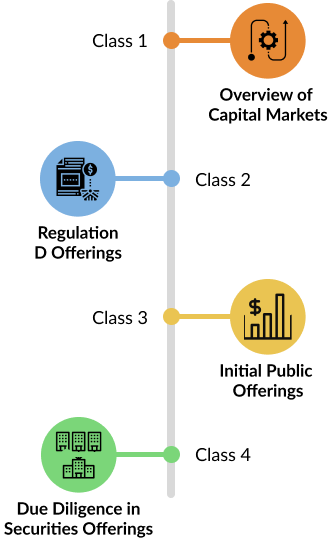
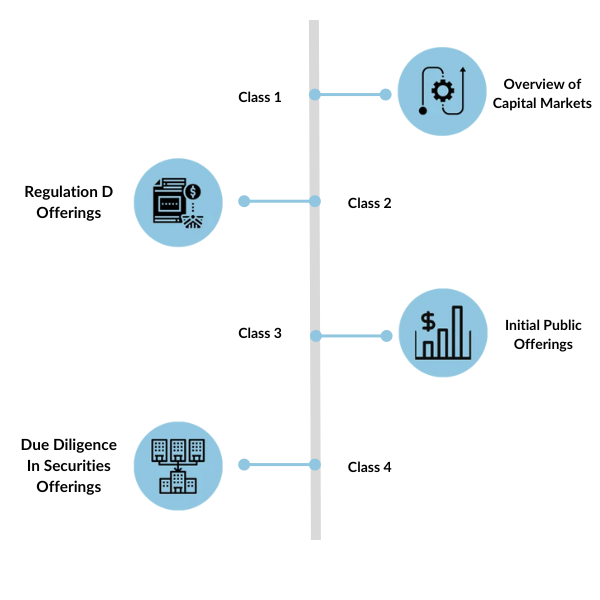
Design Your Law Firm Associate Training Blueprint








Sample Weekly Schedule with AltaClaro
A Sample Weekly Schedule with AltaClaro
Virtual
Orientation
REST
Videos & Quizzes
20 Mins
Virtual
Orientation
REST
Videos & Quizzes
20 Mins
REST
Videos & Quizzes
20 Mins
REST
Videos & Quizzes
20 Mins
How Our Unique Law Firm Training Programs Work
How Our Unique Law Firm Training Programs Work
.png?width=119&height=117&name=Layer%201%20(1).png)
Arrange Your Training Program

Launch With Your Team

Track Engagement, Gain Insights, & Experience Growth
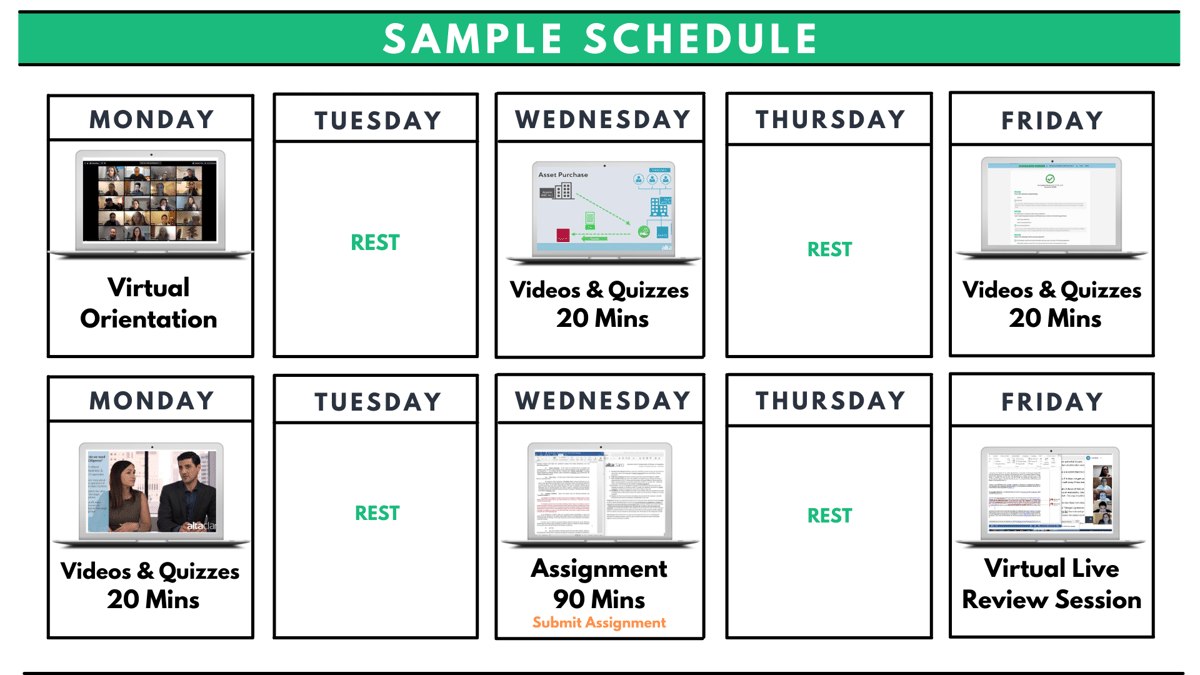
Learn
Do
Review
Pricing Options and Plans
For firms of every size and need, we specifically tailor our courses to fit your legal practice.
Pricing Options and Plans
From boutique firms to large firms, we specifically tailor our courses to fit your legal practice needs.
Solo
(1 Seat)
Small Team
(2 - 4 seats)
Enterprise
(5+ seats)
Learn: Interactive Lessons with experienced practitioners
Do: Apply lessons immediately to solve real world client scenarios
Review: Deepen your learning in review sessions. Review answers and ask questions.
Dedicated Customer Success Manager
Dedicated Class per Firm
Custom Class Dates
Solo
(1 Seat)
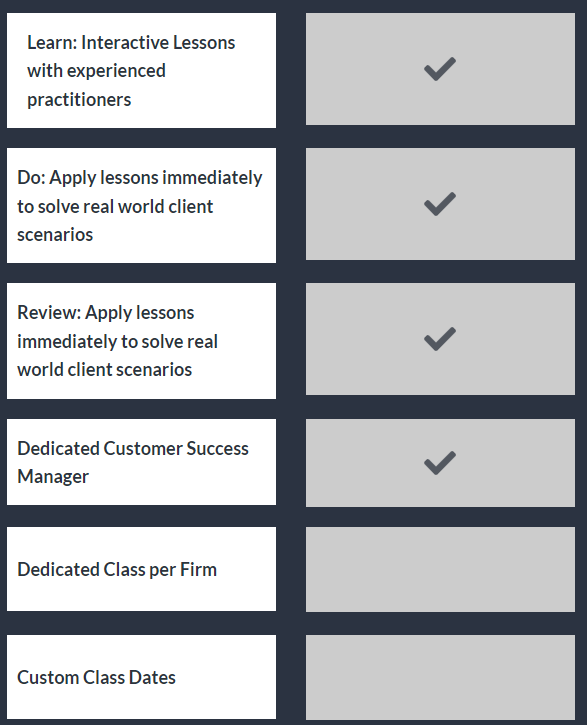
Small Team
(2 - 4 seats)

Per Class: $649
Master Series: $2,750
Enterprise
(5+ seats)
Our Trusted Network of the World’s Leading Law Firms















Our Trusted Network of the World’s Leading Law Firms

















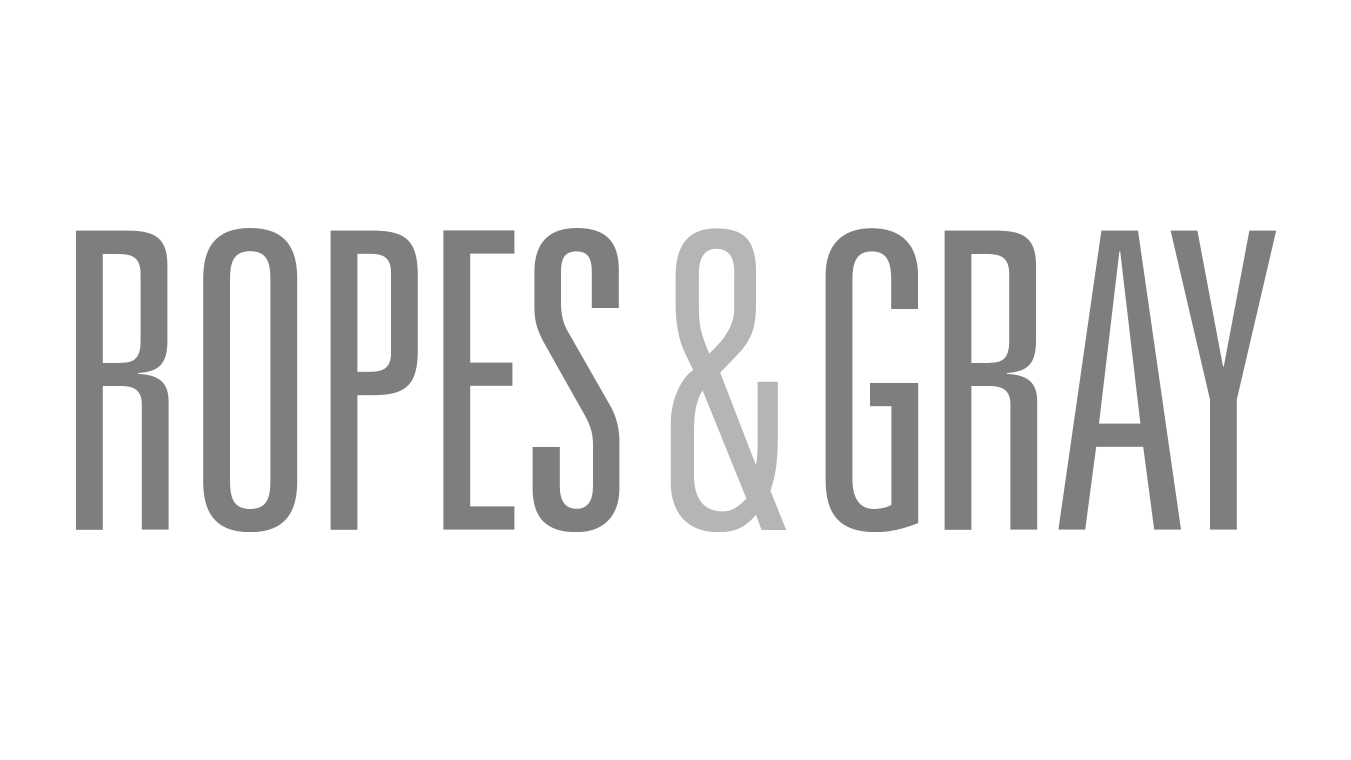
.png?width=666&height=375&name=Haynes-removebg-preview%20(1).png)
